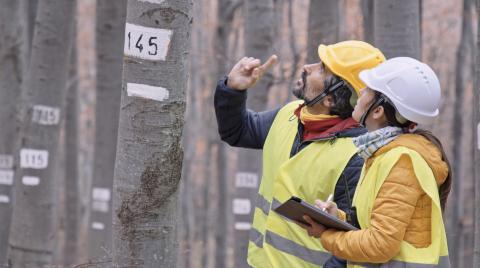Agri-schemes top driver of forest loss in Cambodia
A recent study estimates that 90 % of Cambodian timber products are derived from forest conversion, a fact that speaks to the country’s rapid loss of forest cover. The main drivers of deforestation are rooted in poor governance.
Cambodia’s natural forests are vanishing fast. NEPCon have released a case study supported by Forest Trends that explores the extent of this trend and why this is happening.
The study finds that forests are mainly giving way to agro-industrial crops, social schemes, dams, mines, and plantations. Illegal logging and migrant settlers are also key drivers of deforestation.
Agro-investment key cause of forest conversion
Large-scale granting of Economic Land Concessions (ELCs) for agriculture is the top driver of forest loss in Cambodia in recent years. ELCs presently cover an area of at least 2 million hectares, however the allocation ELCs has not been transparent and their full extent is not known due to a lack of consistent data.  ELCs are thought to provide a cover for illegal logging. The study finds that there are 'signs of clandestine activity', including the use of ELC mills for laundering illegal wood harvested outside the ELCs. It also reports of a typical 'timber rush' on the allocation of a new ELCs, where local people as well as government, military and police officials compete to obtain access to forest resources.
ELCs are thought to provide a cover for illegal logging. The study finds that there are 'signs of clandestine activity', including the use of ELC mills for laundering illegal wood harvested outside the ELCs. It also reports of a typical 'timber rush' on the allocation of a new ELCs, where local people as well as government, military and police officials compete to obtain access to forest resources.
ELCs often overlap with local and customary land tenure, a cause of serious human rights concern. Further granting of ELCs has been officially suspended since 2012, however the move has not yet led to a decline in the rate of forest loss. This may be partly because forest conversion is still on-going in most ELCs.
Dysfunctional frameworks
The evidence suggests that a large timber shadow economy exists in Cambodia. Not only is corruption systemic, reducing the impact of forest laws. In addition, many laws conflict with each other, and the definition of what is ‘legal’ is often subjective.
There are many well-intentioned laws, plans and initiatives in Cambodia. But in reality they are falling short of meeting their objectives, the report says.
One example of this is the Social Land Concessions (SLCs). Though the SLCs are ostensibly earmarked for supporting armed-forces veterans and poor or landless families, abuse of the SLC system is well documented. Local NGOs report that SLCs are used to displace the poor in favour of development projects under the guise of poverty reduction.
Implications for timber product sourcing
 The report is a sobering read for buyers of timber products from Cambodia.
The report is a sobering read for buyers of timber products from Cambodia.
“Buyers need to be aware of the challenges involved”, says Alexandra Banks, NEPCon timber legality expert and co-author of the study. “Great caution is clearly warranted for those seeking to assure the legal origin of Cambodian timber”.
She stresses that ‘official’ documents can rarely be relied on as the sole evidence of legal origin: “Cambodia is a high-risk county in terms of timber legality, and corruption is entrenched in the society. Buyers looking for legal material should be wary of the risk that documents are forged or otherwise not trustworthy”.
FLEGT part of the recipe for change
The report stresses the need to clean up laws and ensure trustworthy data, to create a firm basis for improving the forest sector. In addition, key stakeholders need to come together and define common goals – including the Cambodian government, forest industry, NGOs, investors and consumer markets.
Ms Banks sees the EU FLEGT (Forest Law Enforcement, Government and Trade) Programme as part of the cure for Cambodia’s ailing forest governance. Cambodia is just about to enter the initial stages of the FLEGT VPA (Voluntary Partnership Agreement) negotiation process.“The issues underlying deforestation in Cambodia are all rooted in poor governance. The EU FLEGT process could foster and facilitate much-needed dialogue to put the country’s forest sector on the right track”, she says.
Jade Saunders is Senior Policy Analyst in the Forest Trade and Finance Program at Forest Trends. She highlights a potential VPA process as an opportunity to address Cambodia’s forest sector challenges.
However, “few of the existing VPAs appear to effectively differentiate between legal and illegal conversion timber. Beyond that, it is not yet clear that European NGOs will easily accept FLEGT licensing of any conversion timber, even if it is legal”, she points out.
Ms Saunders: “In countries where conversion rather than harvesting in production forest is the primary source of timber, VPAs will need to be tailored to validate the source and legality of conversion timber effectively. If this can be achieved in the Mekong, it could yield important political and technical lessons for other countries and demonstrate that the VPA approach – linking governance with trade – remains relevant, even if the pressures on forests are changing.”



